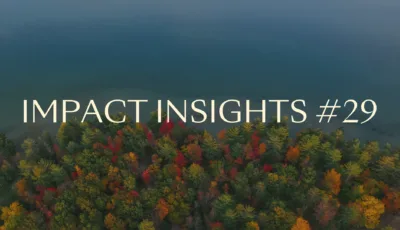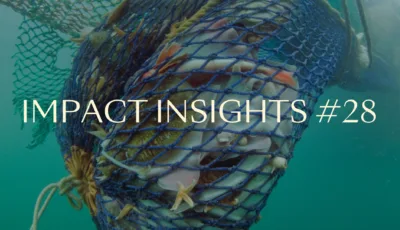Impact Insights #9

Ready to dive into our latest update on the sustainability landscape? Read on to learn about the consequences of melting permafrost, why indigenous people worldwide should play a key role in the development of climate politics, how criminalization impacts young climate activists and more.
■ The US develops National Standard for "zero emission" buildings
The Biden administration is trying to establish a new national standard for “zero emission” buildings to tackle the real estate sector's significant contribution to climate change. The standard, while it's not legally binding, could help real estate developers navigate different definitions and rules aimed at reducing emissions from all types of buildings with very different preconditions. The American building standard will require buildings to be energy efficient, produce no on-site emissions, and use 100% renewable energy, according to a senior administration official. So far, the absence of a standard for sustainable buildings has led to different states setting their own rules and guidelines. Duane Desiderio, from the organization Real Estate Roundtable, says the definition “can bring some desperately needed uniformity and consistency to a chaotic regulatory landscape.”
■ Melting permafrost could revitalize ancient viruses
French virologist Jean-Michel Claveries’ research, raises concerns about the potential resurgence of ancient viruses as Siberian permafrost melts due to climate change. With our planet already 1.2 degrees Celsius warmer than before the industrial age, experts predict the Arctic could be ice-free in summers already by 2030. The melting permafrost, once abundant with animal life, provides the perfect conditions for preserving organic matter. These ancient viruses, if reactivated, could pose a significant danger. As Claverie explains, “50,000 years back in time takes us to when Neanderthals disappeared from the region, […] If Neanderthals died of an unknown viral disease and this virus resurfaces, it could be a danger to us.” Other scientists are advocating a more cautious approach to this type of research. They argue that research such as Claveries’ could potentially worsen the threat of a virus while trying to uncover it, with a high potential for cross-contamination.
■ Why Indigenous knowledge should be included in the development of climate politics
The 2023 World Economic Forum report highlights that indigenous people, comprising just 5% of the global population, are crucial in safeguarding the planet, as they protect 80% of the Earth's remaining biodiversity. Their centuries-old environmental wisdom is invaluable in addressing the climate crisis. Indigenous communities, often living in challenging environments, offer insights into adaptation and response to environmental change. They are also essential in conserving endangered species, maintaining lower deforestation rates, and managing vast carbon stores.
In February 2023, indigenous people from all over the world met at the Indigenous Peoples Forum to discuss ways to spread knowledge about how to promote sustainable practices of living and farming. This, as well as the recent discourse in Norway on wind power production and Sami rights, highlights the importance of including indigenous groups in the planning of climate politics, especially surrounding nature and environmental conservation.
■ New stakeholder request mechanism for changes in the EU Taxonomy
The Platform on Sustainable Finance has launched a stakeholder request mechanism for EU taxonomy changes. The Platform on Sustainable Finance, together with the EU Commission, has launched the stakeholder request mechanism, allowing stakeholders to submit suggestions based on scientific and/or technical evidence on new economic activities that could be added to the EU taxonomy. Stakeholders can also propose changes to the technical screening criteria of existing activities. The Platform on Sustainable Finance will assist the Commission in the analysis of the submitted suggestions and provide recommendations to the Commission. The first overview of feedback will be collected on the 15th of December, but the mechanism will continue to be open after that for feedback until further notice.
■ Increasing criminalization of climate activism causes anxiety and stress among young climate activists
A recent investigation by The Guardian highlights a growing trend of governments around the world using criminalization tactics to silence climate activists from protesting and doing civil disobedience. The charges brought against activists vary but often include vague and time-consuming allegations like subversion, terrorism, or tax evasion. Countries like the US and UK have passed controversial anti-protest laws under the guise of protecting national security or critical infrastructure, such as fossil fuel pipelines. Additionally, in a series of trials, defendants have faced restrictions preventing them from mentioning essential issues like the climate crisis, insulation, fuel poverty, or their motivations as part of their defense. UN Special Rapporteur on environmental defenders, Michel Forts, says he has seen growing anxiety and stress among young climate activists and lawyers because of these laws. The investigation by the Guardian reveals a concerning pattern of suppressing those trying to protect the planet, raising concerns about the impact on both civil liberties and the environment.


